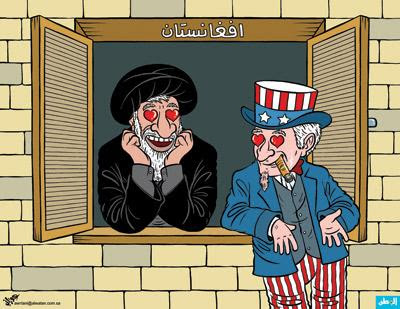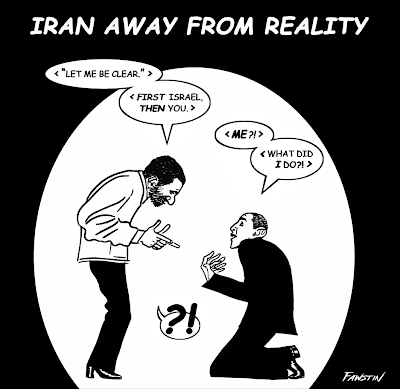IRAN APPEASEMENT 1979, 2010/update
Another day, another suicide bombing. Unlike the Swedish bombing, this time a"successful one." 38 Killed In Terror Strike On Iranian Shia Pilgrims. Reportedly, the culprits belong to Jundullah, a Baluchi 'People's Resistance Movement' founded in 2002. Iran has a myriad of restive minorities. This particular one is Sunni and is located on the Pakistani border and seems to have benefited from it's neighbor's terrorism expertise as it has successfully carried out similar bombings in the recent past. One of those bombing killed six commanders of Iran's elite Revolutionary Guards!
Iran has naturally accused the US of aiding and abetting such minority agitation. After all, the strategic maxim that the enemy of my enemy is my friend would mandate such support. After all, as has been publicly revealed in Wikileaks, Iran is directly responsible for the death of American soldiers and civilians in Iraq and Afghanistan. But the Obama administration considers only Republicans to be enemies. Iranians he treats with respects and seeks to appease regardless of their disdain for him and his appeasing gestures. Last month the US added quietly Jundullah to its list of terrorist organization. Blowing up worshipers is inexcusable but I see no reason to quiet Iranian authorities fears that the US may support minority uprisings. Obama, who failed to support the 2009 post election protest has even hurried to condemn the bombing to the delight of the Iranian authorities who can use it to counter the notion that Iran is isolated.
Does that mean that unlike the Ayatollahs, Western diplomats have failed to digest the lessons of the 1979 Iranian revolution? That is the question asked today by FT's analysts, James Blitz and Roula Khalaf.
Why today? Because Britain is about to publish its own version of the Pentagon Papers, the Browne report. If the FT is to be believed, it is marked"secret and confidential" and"has been one of the more closely guarded papers in the FCO archive." It focuses on Iran, was ordered by then foreign secretary David Owen in 1979. Owen wanted to know the reason British diplomats missed the Iranian revolutionary moment. The analysts found no smoking gun. The failure is attributable to nothing more sinister than a failure to understand the world view of the average Iranian, develop ties with opposition movements and appeasement.
Sir Nicholas reveals in considerable new detail how London set out to appease the shah in the 1970s. On one occasion, diplomats showed the shah the draft of a ministerial answer in the House of Commons on torture in Iran “in case he should object to it”. On another, the FCO “placed” a flattering letter in The Times, describing the shah as “a deeply revered leader”.
In short,"As one FCO diplomat who has read the report says: “More often than not, the sense you get is that it was the shah who was running rings round the British, not the other way round.”
In other words, the Browne reports reveals that British diplomats behaved then as Wikileaks reveals American diplomats are behaving now. For they continue to understand nothing:
In 2005, the UK and its partners were hoping – and for a long time expecting – that Akbar-Hashemi Rafsanjani, the former president who is considered a pragmatic conservative, would win the presidential election, although he was known to be unpopular. Instead, important parts of the regime lined up behind the fundamentalist Mahmoud Ahmadi-Nejad, propelling him to the second round of voting and establishing him as the favourite of Ayatollah Ali Khamenei, the supreme leader.While Mr Rafsanjani was seen by many as part of a corrupt elite, Mr Ahmadi-Nejad successfully tapped into social and economic discontent. He also took advantage of disillusionment with the reformists who had controlled the presidency for eight years, helping expand civil liberties but giving insufficient attention to economic development.
It was perhaps the experience of 2005 that led many western diplomats last year to assume – correctly as it turned out – that Ayatollah Khamenei would ensure Mr Ahmadi-Nejad was returned for a second term. But again, diplomats were caught off guard by a shift in public mood and the remarkable revival of the reformist movement, this time led by Mir-Hossein Moussavi, the candidate who was probably the real winner of the election in the first round.
Indubitably, the West has been paying an extremely high price for the Iranian theocratic revolution but it is about to pay an even higher price. A terror sponsoring nuclear Iran is soon to be part of the international disorder. This, too, is aided and abetted by Western authorities' refusal to see or acknowledge reality. In 2007 Bush hating American intelligence services sought to convince the world community that there is not reason to worry by publishing a fraudulent assessment claiming that Iran stopped developing nuclear weapons in 2003. Today the word is out that a worm has succeeded in delaying Iranian nuclear development for two years.
In other words, we can stop worrying. Sorry, I can't. The less I am told to worry, the more I do. It all seems too convenient for comfort. I place my hope in a second Iranian revolution the West cannot see and even Obama's best efforts cannot block.
In a letter to FT Marc Lee writes that the American ambassador knew that the Shah was going to be toppled but Polish national security adviser Zbigniew Brzezinski refused to pay attention as he was more interested in East European affairs:
Mr Sullivan sat me under the Richard Helms tree in his embassy garden, a tree free from bugging devices, where he told me what would happen and advised against any business commitments.He told me that he could not secure a hearing from the then US national security adviser, whose interest lay to the east and west of the Oder-Neisse line and did not extend to Tehran.
However, Mr Sullivan had an excellent appreciation of what was happening on the ground and indeed on one occasion took me into a market in the Iranian capital to show me tapes of the speeches of the Ayatollah being distributed free to people doing their shopping.
In this aspect, I believe the Browne report to have been essentially inaccurate. Mr Sullivan and his embassy certainly appreciated the situation.

